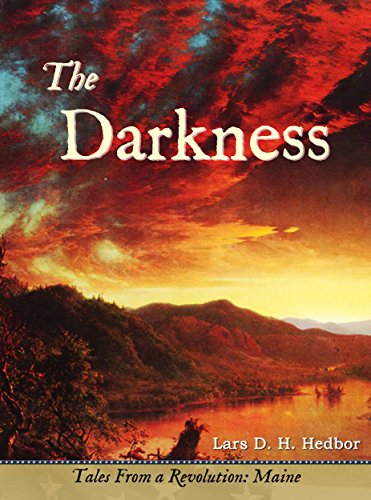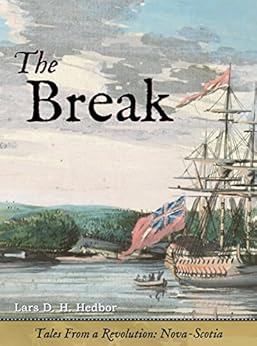MJN: You state
that your mission is to explore the lesser known episodes from the American
Revolution. I feel solidarity with you in that regard, as it is my own mission
to uncover hidden gems and illuminate obscure figures. That presents a
potential challenge from the marketing perspective. On one hand, you don't want
to write an umpteenth fictionalized account about George Washington. On another
hand, you want the characters to be somewhat recognizable. Some readers
gravitate towards the familiar, and others gravitate towards the obscure and
previously unexplored. How do you find that balance?
LH: One of the animating
principles of my writing is the fact that events are shaped not only by those
who stride across the pages of our history books, as mythical colossi, but also
-- perhaps mostly -- by ordinary people, making daily decisions about how best
to muddle through.
Too,
as you note, many of the stories of the powerful and famous have been explored ad
nauseum in fiction, and there's not much that I think I can add to
those accounts. I have discovered that there's a hunger for stories that
readers can relate to their own lives, too, and only a small fraction of any
potential audience consists of people who will be historical figures in a
future classroom text. ;)
Beyond
that, though, the American Revolution is often reduced nearly to caricature --
the brave and heroic Minutemen facing down the craven Redcoats in Boston, New
York, and Philadelphia -- and the complexity and context of the familiar events
of that struggle are lost. There were good and brave men (and women!) on
both sides of the contest, people with less-noble intent, and lots of folks
just muddling through while events beyond their ken unfolded around them.
Their
stories are no less compelling for being less-known, and I like to think that
by telling them, I can help to right the many injustices committed by
simplistic teachings of our national origin story.
MJN: You list playing fiddle as one of your passions. I imagine, you have endeavored playing some of the English, Scottish and American tunes from the Colonial period.
LH: Oh, I wish I had enough skill to play those! In truth, I would love to take them on, but time for practicing on the fiddle is quite limited with everything else that I do. Now you've got me wondering where to find some sheet music, though... so perhaps soon.
MJN: Tell us about your publisher. It looks like it's a small tight-knit group of authors. Is it a thematic co-op, or a traditional small press that occasionally opens to submissions?
LH: I started out published by a small indie press. After my first book, which enjoyed modest success in their hands, they developed an interest in going in other directions than traditional historical fiction, so I struck out on my own, founding Brief Candle Press. Later, I had the tremendous good fortune to acquire a handful of solid midlist science fiction books by truly gifted and well-reviewed authors. Since then, I have taken on a couple of new titles, but being essentially a one-man show, I do not at present have the luxury of developing a "slush pile," although that may change in the future.
MJN: The titles of your novels are terse, even Spartan in their brevity. The Prize, The Break, TheSmoke, The Light. Is there a deliberate motive behind the titles of the novels?
LH: In titling my books, I have tried to capture their central themes in a single word. The Prize refers both to Carleton's Prize, a tiny island in Lake Champlain that figures heavily in the story, and to the prizes of liberty and love that my characters seek. The Smoke evokes both the smoke of a campfire, and the brutal destruction suffered by the tribes of the Iroquois Confederation as they were forced to choose sides between the British and the Americans. And The Light reflects the deep introspection of its Quaker characters as they seek the moral clarity of their inner light as they consult with God to find a way forward between the violence of the Revolution and their core beliefs, at risk of British suppression.
MJN: You list playing fiddle as one of your passions. I imagine, you have endeavored playing some of the English, Scottish and American tunes from the Colonial period.
LH: Oh, I wish I had enough skill to play those! In truth, I would love to take them on, but time for practicing on the fiddle is quite limited with everything else that I do. Now you've got me wondering where to find some sheet music, though... so perhaps soon.
MJN: Tell us about your publisher. It looks like it's a small tight-knit group of authors. Is it a thematic co-op, or a traditional small press that occasionally opens to submissions?
LH: I started out published by a small indie press. After my first book, which enjoyed modest success in their hands, they developed an interest in going in other directions than traditional historical fiction, so I struck out on my own, founding Brief Candle Press. Later, I had the tremendous good fortune to acquire a handful of solid midlist science fiction books by truly gifted and well-reviewed authors. Since then, I have taken on a couple of new titles, but being essentially a one-man show, I do not at present have the luxury of developing a "slush pile," although that may change in the future.
MJN: The titles of your novels are terse, even Spartan in their brevity. The Prize, The Break, TheSmoke, The Light. Is there a deliberate motive behind the titles of the novels?
LH: In titling my books, I have tried to capture their central themes in a single word. The Prize refers both to Carleton's Prize, a tiny island in Lake Champlain that figures heavily in the story, and to the prizes of liberty and love that my characters seek. The Smoke evokes both the smoke of a campfire, and the brutal destruction suffered by the tribes of the Iroquois Confederation as they were forced to choose sides between the British and the Americans. And The Light reflects the deep introspection of its Quaker characters as they seek the moral clarity of their inner light as they consult with God to find a way forward between the violence of the Revolution and their core beliefs, at risk of British suppression.
I'll
confess that I sometimes struggle to find a title for a new book that fits this
now well-established pattern, but then I'll go back and re-read the book and
discover that there is a central theme that I'd like to bring to the
fore. With their subtitles (e.g., The Prize: Tales From a Revolution -
Vermont), they would be pretty unwieldy names for books, too, so this
practice works well for a number of reasons.
MJN: The blurbs of your novels also have a similar element, referencing a seemingly ordinary protagonist: "another farm boy", "a simple sailor", "an ordinary young woman". There is something special about everyday people who hold no political power witnessing or participating in events of historical significance.
MJN: The blurbs of your novels also have a similar element, referencing a seemingly ordinary protagonist: "another farm boy", "a simple sailor", "an ordinary young woman". There is something special about everyday people who hold no political power witnessing or participating in events of historical significance.
LH: I think that most of us
feel that we are people of limited political power in our own lives, and I
would like both to entertain my readers with stories of how "just
folks," while they might sit outside of the limelight of the historical
record, helped to create that historical record -- and also, more subversively,
to cause my readers to realize that they are capable of leaving
their own marks on history, even if their names are not recorded in its
hallowed halls.
I
believe very strongly that we can best understand our present (and work to
shape our future) by understanding our past, and while it is informative to
study the lives and choices of those whose names we do remember, I think that
it's even more interesting and useful to understand how regular people lived
and what choices they made.




Absolutely brilliant interview! I so agree about the importance of the ordinary and look forward to all these books. :-)
ReplyDelete